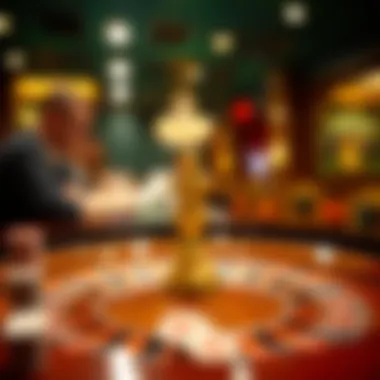Effective Strategies for Profiting from Roulette


Intro
Roulette, a classic casino game, has attracted countless players with its promise of high stakes and thrilling experiences. The game revolves around a small ball that spins around a wheel, landing on one of several pockets. Its simplicity invites both novices and seasoned gamblers alike, each seeking their fortune. But beyond the excitement and glamour, there lies a deeper understanding of how to approach the game strategically if one aims to earn from it.
This guide focuses on a range of strategies to enhance your approach to roulette. By delving into various techniques and tactical insights, you can better navigate the world of chance and probability. The key is not solely how to play but understanding the nuances that can influence your odds of success.
Game Strategies
Essential Tips for Beginners
If you're just starting your journey into the world of roulette, knowing where to begin is crucial. Here are some essential tips to help you establish a solid foundation:
- Know the Different Types of Roulette: Familiarize yourself with the game variations. The most common ones are European and American roulette. European has a single zero, while American has both a single and double zero, giving the house an edge.
- Start with Simple Bets: When you feel the adrenaline rush as the wheel spins, it’s best not to get too ambitious early on. Begin with outside bets like red/black, odd/even, or high/low. These bets have nearly a 50% chance of winning.
- Set a Budget and Stick to It: Before you even sit down at the table, decide on a limit for your bankroll. It’s easy to lose track of time and money in the casino atmosphere. A clear budget helps maintain discipline.
- Use a Betting System Wisely: Systems like the Martingale involve doubling your bet after a loss. While it sounds enticing, it can lead to significant losses if you're not cautious. Use such systems judiciously and always supplement with proper bankroll management.
Advanced Tactics for Seasoned Players
For those who have ventured past the beginner stage, there exist advanced strategies to refine your approach:
- The Fibonacci Sequence: This betting system is based on the well-known sequence of numbers. You place bets in accordance with the Fibonacci series—1, 1, 2, 3, 5, etc. For instance, if you lose the first four rounds, you would bet 5 on the fifth round to potentially recoup losses.
- Visualize the Wheel: Seasoned players sometimes believe they can spot anomalies in the wheel or the dealer's behavior. While this may seem speculative, maintaining a keen observation can provide insights that are otherwise overlooked.
- Split Betting Strategy: This approach involves mixing inside and outside bets. By placing a small portion of your chips on high odds bets while securing a fraction on low odds, you might mitigate some risks without sacrificing opportunities for high rewards.
- Track Trends, But Do So Cautiously: Keeping an eye on previous results can be beneficial. Players often discuss the term "hot" and "cold" numbers. However, remember that each spin is independent, and past results do not influence future outcomes.
"In roulette, as in life, patience and discipline are virtues."
Responsible Gaming
Recognizing Problem Gambling
Understanding your limits is paramount when engaging in gambling, particularly in a high-energy environment like a casino. Signs of problem gambling can include:
- Increased Frequency of Play: If you find yourself visiting casinos more than usual or gambling online extensively, consider reassessing your habits.
- Chasing Losses: Attempting to recover lost money by betting larger amounts can lead to deeper losses. This is often a slippery slope.
- Neglecting Responsibilities: If gambling begins to interfere with your personal relationships or responsibilities, it is time to take a step back and evaluate the situation.
Tools and Resources for Safe Gambling
Various resources exist to promote responsible gaming while aiding those who may struggle with gambling addiction:
- National Council on Problem Gambling (NCPG): An established organization that provides resources and support for problem gamblers (https://www.ncpgambling.org).
- Gamblers Anonymous: A support group that offers a community for individuals seeking to manage their gambling behavior.
- Self-Exclusion Programs: Many casinos offer self-exclusion programs, where you can voluntarily limit your access to gambling facilities or online platforms for a designated period.
By implementing responsible gaming practices, you not only enhance your own experience but contribute to a healthier gambling environment for all participants. Always remember that while the thrill of roulette can be enticing, the priority should be protecting your well-being.
Prelude to Roulette
Roulette stands as one of those classic casino games that has captured the attention of gamblers for centuries. The wheel spins, the ball dances, and with each revolution, the stakes rise, making it a thrilling experience for players. Knowing the game well is crucial, not just for enjoyment, but for maximizing potential returns. In this section, we will shed light on the importance of understanding both the allure and the fundamental aspects of roulette, providing the groundwork for any strategy aimed at profiting from this iconic game.
The Allure of the Game
Roulette is drenched in history and glamour. The very mention of the game conjures images of elegant casinos in Monte Carlo or Las Vegas, where the high-stakes action fills the air. One notable aspect of roulette is its simplicity; you place your bets, spin the wheel, and let fate take its course. Yet, this simplicity belies a complex interplay of luck, strategy, and psychology that can keep players on their toes.
The game’s allure also lies in the variety of betting options available, which can cater to different risk tolerances. For those feeling bold, betting on a single number can yield high returns. Alternatively, a safer bet on red or black offers better odds of winning.
In many ways, roulette encapsulates the thrill of chance, which can be intoxicating. Many seasoned gamblers are drawn to the table not just for the possibility of profit but for the sheer excitement of the spin. Whether it's watching the wheel slow to a stop or the anticipation of a winning number flashing up, this game engages both novices and experts alike.
Understanding Roulette Basics
Before diving into strategies aimed at earning from roulette, it’s essential to get a firm grip on the basics of the game. At its core, roulette revolves around a wheel and a ball. The wheel has numbered slots, alternating between red and black, with one or two green slots depending on the variant of the game. Gamblers place wagers on where they predict the ball will land, leading to a series of bets that can range widely in odds and potential payouts.
In European roulette, you will find numbers 1 through 36, plus a single zero. In contrast, American roulette includes an extra double-zero, ramping up the house edge. Understanding these foundational differences is paramount when choosing a table to play at, especially since it directly influences your odds of winning.
Moreover, recognizing the types of bets you can place is equally important.
- Inside Bets: These involve placing chips directly on numbers, offering higher payouts but with lower odds of success.
- Outside Bets: These bets are on broader categories like ‘odd/even’ or ‘red/black,’ with better chances of winning, yet with smaller payouts.
Getting familiar with these basics will empower you as a player and set the stage for employing advanced strategies later. So, lace up your betting shoes; the green felt awaits your next move.
Variations of Roulette
Understanding the various types of roulette games is crucial for anyone looking to profit from this fascinating casino staple. Each variation comes with its own set of rules, bet types, and, most importantly, house edges. Knowledge of these can significantly impact your strategy and ultimately steer your betting decisions. Players who grasp these differences can better tailor their playing style to suit the variation they choose.
European Roulette
European Roulette is often considered the gold standard among roulette enthusiasts. With a single zero on the wheel, it boasts a lower house edge of about 2.7% compared to its American counterpart. This slight adjustment can seem trivial, but it packs a punch over time.
In European Roulette, players can make various bets, including:
- Inside Bets: Placing chips on individual numbers or small number groups.
- Outside Bets: Covering larger sections of the wheel such as odd/even or red/black.
One of the biggest advantages of this variation is the presence of the En Prison rule, allowing players a second chance on even-money bets when the ball lands on zero. This can effectively cut the house edge even further, making it a favorite for more strategic gamblers.
American Roulette
American Roulette tends to draw more casual players, mainly due to its association with flashy casinos and vibrant nightlife. This version, however, includes both a single and a double zero on the wheel, bumping the house edge up to around 5.26%. This higher risk means that players tend to lose their bets more quickly compared to European Roulette.
The American variant also offers similar betting options to European Roulette, but with a different spin—pun intended. Some might argue that the double zero enhances the excitement, creating a more dynamic playground for betting, but there’s no denying that it complicates the odds.
Unique Bets in American Roulette:
- The Top Line Bet: Betting on 0, 00, 1, 2, and 3 gives a potentially high payout but carries a heavier risk.
For serious gamblers, this higher house edge means being more cautious and perhaps leaning more on established strategies to mitigate the odds against them.


French Roulette
French Roulette is similar to European Roulette but packed with unique features that make it distinct. Featuring both a single zero and a house edge similar to its European counterpart, it retains the 2.7% house edge. What sets it apart are the La Partage and En Prison rules, both of which can protect players' bets better than in the American version.
- The La Partage rule allows players to recover half their even-money bet if the ball lands on zero, thereby cushioning the loss.
- Comprising French labels, the wheel includes betting options that might differ in display from the English setups. For instance, terms may vary, but the betting logic remains intact.
French Roulette typically attracts players who seek a balance of risk and reward through these unique guidelines. Usually, the atmosphere in French casinos is also more subdued, often reflecting a more strategic approach to the game.
"In the end, whether it’s the thrill of the chase or the allure of profit, understanding the variety of roulette is key to gaining an edge over the odds."
The Mathematics Behind Roulette
Understanding the mathematics behind roulette is akin to revealing the underlying blueprint of this classic game of chance. This section shapes the foundation of effective betting and winning strategies, providing a clearer picture of the game’s mechanics. The interplay of numbers, odds, and house advantage offers critical insights for players seeking to maximize their experience, enhancing potential profitability amidst the thrill of numbers spinning on the wheel.
House Edge Explained
In the realm of casino games, the term house edge serves as a crucial benchmark for players. It represents the mathematical advantage that the casino holds over the players. Specifically, in roulette, the house edge varies depending on the type of roulette being played. For instance, European roulette, featuring a single zero, has a house edge of about 2.7%. In contrast, American roulette, with its double zero, typically registers a house edge of approximately 5.26%.
This difference may seem small, but when you zoom in on your betting over time, it can drastically alter your returns. Many players, especially those new to the game, undermine this aspect, thinking they can circumvent the odds with specific strategies. Yet, knowing the house edge helps players assess their risk better and strategize their bankroll accordingly.
Key Takeaways About House Edge:
- It represents the casino's profit margin over time.
- European roulette is generally more favorable to players due to its lower house edge.
- Awareness of house edge aids in making informed betting decisions.
“The secret of getting ahead is getting started.” Let the knowledge of house edge drive your decision-making.
Probability and Payouts
When it comes to roulette, understanding probability is essential for crafting a successful betting strategy. Each outcome in roulette holds specific odds, which determine the potential payout for various types of bets.
Types of Bets and Odds:
- Straight-Up Bet: Betting on a single number offers a payout of 35 to 1, with a probability of winning around 2.63% in European roulette.
- Split Bet: A bet on two adjacent numbers offers a payout of 17 to 1, slightly increasing your chances with a winning probability of 5.26%.
- Red/Black, Odd/Even: These even-money bets seem enticing, offering a payout of 1 to 1 and a probability of about 48.65% in European roulette.
Understanding these odds and working out potential payouts can lead to smarter betting decisions. Players should keep in mind that the more likely an outcome is, the smaller the payout. The objective is to balance risk with reward, ensuring that your strategy aligns with your comfort level in terms of spending.
Important Considerations:
- Familiarize yourself with the various bets and their respective payouts.
- Assess your risk tolerance to determine where to place your bets.
- Be mindful of the interplay between probability and payout; riskier bets offer larger payouts, but with lower chances of winning.
Every spin of the wheel isn’t just a game of chance; it’s a complex dance of probability and risk management that can lead to fruitful outcomes for those who are prepared.
Strategies for Profiting from Roulette
Mastering roulette isn’t just about spinning the wheel; it’s about knowing how to play your cards right. Strategies for profiting from roulette not only enhance your enjoyment but also increase your chances of coming away with a bit more in your pocket. This section will delve into a few popular strategies, each with its unique approach to betting. The usefulness of these strategies heavily relies on understanding the foundation they are built on and knowing the risks involved.
Martingale Strategy
The Martingale Strategy is perhaps one of the most talked about systems in the gambling world. The fundamental idea hinges on the principle of doubling your bet after every loss. So, if you start with a bet of $5 and lose, your next bet should be $10. If you lose again, you double it to $20, and so on until you finally land a win. This strategy rests on the belief that you will eventually win back your losses plus a small profit.
Key Points of Martingale:
- Simple to understand and follow.
- Theoretically, you can recover losses if you have enough bankroll.
- Risks running out of money during a losing streak.
However, it’s crucial to recognize the limitations of this strategy. Casinos often impose table limits that can quickly trap a player in a losing spiral. A long losing streak can lead to staggering bets that significantly surpass your budget, throwing your bankroll off track.
'Alembert System
The D'Alembert System provides a somewhat safer alternative to Martingale. In this system, you increase your bet by one unit after a loss and decrease it by one unit after a win. For instance, if you start with a bet of $5 and lose, your next bet goes up to $6 and then back down to $5 should you win. This gives you the ability to tread more lightly, reducing some of that nail-biting pressure associated with betting.
Advantages of D'Alembert:
- Less aggressive than Martingale
- Allows for more controlled betting
- Can be beneficial in managing your bankroll more effectively
D'Alembert can be useful in the long haul as it doesn’t require as massive bankroll backing but relies on the same basic tenets of luck that underpin any gambling game. You’re still operating under risk, but it aims to smooth out the rollercoaster effect that some players dread.
Fibonacci Strategy
The Fibonacci Strategy draws on the classic Fibonacci sequence, where each number is the sum of the two preceding ones. In betting, you can outline your units, such as 1, 1, 2, 3, 5, 8, etc. If you apply this to roulette, after losing a bet, you should move to the next number in the sequence to determine your next wager. If you win, you step back two numbers. This approach serves as a middle ground between aggressive and conservative betting methods.
Pros of Fibonacci:
- Visually intuitive and systematic.
- The sequence limits the risks taken with each bet.
- Continuously recalibrates your stakes based on performance.
Even though Fibonacci is gentler on the bankroll, it’s still essential to bear in mind that the house edge remains. A series of losses can add up quicker than anticipated.
Flat Betting Approach
If you prefer to fly straight and steadily, the Flat Betting Approach might be your style. This method simply involves betting the same fixed amount each time, regardless of wins or losses. So, if you choose to always bet $10, that's what you'll stick with. Flat betting is often viewed as one of the safest methods to maintain your bankroll.
Benefits of Flat Betting:
- Strong emphasis on bankroll preservation
- Reduces stress associated with rapid betting changes
- Ideal for casual players who wish to enjoy the game
This approach removes the emotional highs and lows from the betting experience. It encourages responsible gaming, allowing players to keep their head clear while enjoying the game without the whims of fluctuating bet sizes.
"In roulette, a player’s strategy should ideally reflect their risk tolerance and understanding of the game. The right approach often makes all the difference."
Ultimately, whichever strategy resonates with you, it is prudent to remember that roulette remains a game of chance. Success or failure depends on numerous factors, and no strategy can guarantee a win every round. Understanding the nuances of each method can improve your experience and possibly your yield as you delve into the world of roulette.


Bankroll Management in Roulette
Effective bankroll management is the backbone of any successful gambling strategy. Without a careful plan regarding how much money you are willing to risk, even the best strategies can fall flat. It’s not just about having enough cash to play but also knowing how to allocate your funds wisely. Bankroll management minimizes losses and can significantly extend your gaming experience, ultimately allowing for smarter play.
Setting a Budget
Setting a concrete budget is paramount. Decide upfront how much you are comfortable with losing. This figure shouldn’t impact your living expenses; think of it as your entertainment expenditure. A good starting point is to allocate a specific amount for each session. Suppose you opt for a $200 budget for one evening at the roulette table; ensure you stick with this. When that budget is gone, it’s simply time to walk away. This approach gives you peace of mind and prevents regrettable financial decisions that can linger long after the chips are stacked away.
- Determine Time Frame: How long will you be playing? The longer you play, the higher your risk of losses. Consider your time constraints when budgeting.
- Daily, Weekly, or Monthly Allocations: You might want to break it down further. If you plan to visit a casino frequently, look at a weekly budget as well. Daily limits are excellent for those who like shorter sessions.
Setting boundaries isn’t simply smart; it’s a vital part of playing the game responsibly. If you are hitting the tables to enjoy yourself, avoid viewing your time as merely a pathway to financial success. A solid budget ensures that fun remains at the forefront.
Deciding Bet Sizes
Once you have a budget, you need to determine how much to bet per spin. This decision depends on the overall size of your bankroll and how long you wish to play. For instance, if you've set aside $200 for a session, placing a bet of $10 per spin could yield roughly 20 spins if you don’t hit any wins. Not only does this allow you enough time to gauge the game and adapt your strategy, but it also reduces the risk of losing your entire bankroll too quickly.
Tip: A common practice is to limit your individual bets to around 1% to 5% of your total bankroll. This strategy enables you to play longer, which can lead to better long-term outcomes.
- Flat Betting: Stick with a consistent bet size for every spin. This straightforward approach simplifies the decision-making process.
- Percentage Betting: Go for a flexible method by betting a set percentage of your bankroll. This plan changes your bet size dynamically as your bankroll fluctuates, offering cushioning against losses while benefiting from wins.
Remember, deciding how much to bet at roulette requires reflection on not only your current bankroll but also your level of comfort with risk. Adjusting your bet accordingly is essential. The essence here is to enhance the enjoyment of the game without risking your financial security. By mastering these aspects of bankroll management, you’re setting yourself up to navigate the volatile waters of roulette with confidence.
Psychological Aspects of Roulette
Understanding the psychological aspects of roulette is crucial for anyone looking to increase their chances of coming out ahead. The blend of thrill, anticipation, and quick decision-making creates a unique experience for players. Recognizing how emotions can skew judgment is vital. Gamblers often find themselves caught in the web of hope or despair, which can lead to detrimental decisions.
Emotional Control
Emotional control is like the sturdy rudder of a ship navigating a stormy sea. It keeps the gambler on course when the winds of fortune swing wildly. Winning can bring a rush of adrenaline, creating a false sense of invincibility. Conversely, losses may trigger feelings of frustration or panic. Players must learn to manage these emotions effectively.
One strategy to improve emotional control is setting strict limits. Deciding in advance how much to bet and how long to play establishes a baseline of expected behavior. This approach can help mitigate the pain of losses and enhance the enjoyment of wins. For example, if you decide to play for an hour and limit your budget to a specific amount, you can enjoy the game without the emotional rollercoaster that often comes with chasing outcomes.
Another technique for maintaining emotional stability is mindfulness. Being fully present helps in recognizing emotional responses as they arise, allowing the player to make rational choices rather than impulse-driven ones. Taking a deep breath after a loss, acknowledging the feeling, but not acting on it, can be a game-changer. Embracing a more steady approach may allow you to withstand the ups and downs of the game, ultimately leading to a better long-term experience.
Understanding Risk vs Reward
The concept of risk versus reward is at the heart of gambling. Each bet placed on the roulette table carries a different level of risk, but also varying potential rewards. Successful players must understand this balance to make informed betting decisions.
Roulette offers a plethora of betting options, each with its own odds and payouts. For instance, a straight bet on a single number has the potential for a 35 to 1 payout, but it comes with much lower odds of winning—only about 2.6% for European roulette. In contrast, betting on red or black offers nearly a 50% chance of winning, but the payout is only even money.
Knowing how to navigate these odds is crucial. Players who can assess whether the potential reward justifies the risk are more likely to stay ahead. It’s often said that taking calculated risks is better than putting faith into blind luck. Decisions should be rooted in logic, not emotion, encouraging a more strategic approach to each spin.
In roulette, being aware of risk versus reward is like having a compass. It guides you through each bet and helps avoid getting lost in emotion.
In the end, understanding the psychological elements of roulette doesn't guarantee a win, but it lays a solid groundwork. By applying concepts of emotional control and risk evaluation, players can approach the game with clarity and purpose, turning the chaotic nature of roulette into a potentially profitable endeavor.
Common Mistakes to Avoid
Understanding the pitfalls in roulette is just as important as knowing the strategies to win. Making the wrong moves can cost not only your bankroll but also your enthusiasm for the game. Many people hop into a roulette game thinking they can just have fun and figure it out as they go along. However, there are common mistakes that you must be aware of to maximize your chances of coming out ahead.
Chasing Losses
One significant blunder players tend to make is the act of chasing losses. After a series of unfortunate spins, there’s a strong urge to recoup those losses immediately. Gamblers often believe that they are due for a win after a losing streak, which is a faulty logic. The truth is, each spin of the wheel is independent; it doesn't matter how many times you’ve lost. If you keep betting more in hopes of covering previous losses, you potentially dig yourself into a deeper hole. It's essential to have a cool head and recognize that losses are part of the game.
"The secret to winning is often knowing when to stop, not when to gamble even more.”
Overextending Your Bankroll
A lack of disciplined bankroll management can quickly lead to disaster. Many make the mistake of overextending their bankroll in the heat of the moment. It's easy to get swept away, particularly in a vibrant casino atmosphere, but letting emotions guide your financial decisions is a recipe for disaster. Setting firm limits on how much you're willing to wager before starting is crucial. Stick to a designated budget, and don't go beyond it. When you've hit your limit, take a step back. This disciplined approach gives you the best chance to enjoy the game while minimizing your financial risk.
Ignoring Game Rules
Another common error is simply not understanding the game rules. Knowing how the game operates can significantly impact your decision-making process and potential earnings. Take the time to familiarize yourself with the different types of bets, odds, and rules particular to the variation you’re playing. Ignoring these can lead to making poor decisions that could have been avoided. Each roulette game has nuances that can alter your strategy and understanding; don’t brush them aside. You wouldn't jump into a new job without knowing how to do the work, so why enter a casino without knowing the rules?
By avoiding these mistakes, you can approach roulette with a more strategic mindset and give yourself a fighting chance at coming out on top.
The Role of Casino Atmosphere
A casino is not just a place where games are played. It is an intricate world filled with sights, sounds, and sensations that play a crucial part in the overall gambling experience. The atmosphere in a casino can significantly influence players' decisions and behaviors. Understanding this aspect is essential for anyone looking to earn from roulette. It offers insights that go beyond mere strategies and into the psychology of gambling itself.
Impact on Decision Making
The very layout and design of a casino can impact a player's decision-making process. From the moment you step through the doors, you are enveloped in a carefully crafted environment designed to evoke excitement. The vibrant colors, the sounds of coins clinking, and the frenzied energy of fellow gamblers create a sense of urgency.
- Visual Clarity: Often, bright lights and flashy displays catch the eye and can lead to impulsive decisions rather than measured choices. The overwhelming stimulus can distract players from what they originally intended to do.
- Mood Enhancement: The atmosphere is often enhanced by the presence of drinks and food, which can create a welcoming, yet dangerous, environment. While sipping a cocktail may loosen you up, it can also cloud your judgment regarding your bankroll and strategy.
It’s not uncommon for players to take more risks in a high-energy environment. For instance, hearing others celebrate victories might spur someone to increase their bet size or switch strategies, believing luck is on their side. It goes without saying that decisions made in such fervent conditions may not always align with a sound strategy.
Social Influences
The social aspect of gambling cannot be overstated either. In a bustling casino, you're surrounded by other players. This communal atmosphere can influence your choices—positive or negative.
- Peer Pressure: The camaraderie among players at a roulette table might sway you to embrace risks you wouldn’t ordinarily take in isolation. Watching someone double down on a bet can inspire you to follow suit, disregarding your established strategy.
- Shared Experiences: On the flip side, being around more experienced players can benefit novice gamblers. Observing the outcomes of various strategies while engaging informally with seasoned gamblers can provide insights that are not easily found in literature or online forums.
Regulations and Ethics of Gambling
Engaging in gambling, whether it’s around a roulette wheel or through an online platform, is not just about luck and strategy. It's also about understanding the framework within which this activity operates. The regulations and ethics of gambling play a vital role in ensuring a fair game while promoting a safe and responsible gaming environment. Marking the boundaries of acceptable behavior, these laws ensure that players are not taken for a ride by deceptive practices and that their rights are protected.
The significance of these regulations cannot be stressed enough. They serve as guidelines to maintain order in what can often be a chaotic and high-stakes setting. By comprehending these legal factors, players can navigate the landscape more effectively, minimizing risks while maximizing enjoyment. Here’s why it’s crucial:


- Protection of Players: Regulations shield gamblers from fraud and ensure that games are conducted fairly.
- Encouraging Responsible Gambling: Various organizations are committed to promoting responsible gambling practices.
- Providing Legal Redress: If players find themselves in disputes over winnings or other issues, the law provides a pathway for resolution.
- Supporting Ethical Practices: Operators are encouraged to uphold ethical standards, embedding integrity within the gambling industry.
Understanding Local Laws
Every jurisdiction comes with its own set of gambling laws, which can often be a tangled web to decode. Understanding local laws is essential for any player, as what’s acceptable in one area may well be classified as illegal in another. For instance, while some states in the U.S. have legalized online gambling, others may have zero tolerance towards it. Similarly, countries like Spain may have more lenient regulations, promoting a vibrant gaming scene, while places like the UAE impose strict restrictions.
In this regard, it’s important to:
- Research Local Regulations: Keep up-to-date with the laws applicable in your area. Check official government resources like www.naspl.org or your local government’s website.
- Consider the Type of Gambling: Understanding what forms of gambling are allowed—be it land-based casinos, online casinos, or sports betting—will assist you in making informed choices.
- Know Your Rights: Familiarize yourself with players’ rights in your jurisdiction. This includes withdrawal policies and what recourse you have if things go south.
Responsible Gaming Practices
While regulations lay down the framework, responsible gaming practices help players stay within the lines of these rules. This includes knowing your limits—financially and emotionally. Gambling can be a thrilling pastime, but when not approached with caution, it can lead to significant pitfalls.
Here are some practices to adopt for a balanced gambling experience:
- Set Time and Financial Limits: Define how much time and money you can afford to spend. This brings discipline and prevents impulsive decisions.
- Educate Yourself About the Game: Knowledge goes a long way in helping you make better decisions. Knowing the odds and game mechanics can aid in lowering the chances of losses.
- Stay Mindful of Your Mental State: If gambling starts feeling like a chore or leads to frustration, it might be time to take a step back and reassess your approach.
- Seek Help When Needed: Various organizations provide support to gambling addicts. Websites like www.ncpgambling.org or forums on www.reddit.com can offer guidance and community support.
Impact of Technology on Roulette
The landscape of gambling has changed drastically over the past few decades, and technology has been at the forefront of this revolution. When discussing roulette, it’s essential to understand how technology reshapes how players engage with the game. This section will highlight key elements surrounding technology's influence, the benefits it brings to players, and considerations for those looking to spice up their roulette experience.
Online Roulette Versus Traditional
Gone are the days when one had to visit a casino to place a bet on a spinning wheel. Online roulette platforms have surged in popularity, offering the same thrill from the comfort of one’s home. The experience is notably different:
- Convenience: Online roulette allows players from all around the world access to games at any hour. No more dressing up or traveling; just grab your device and you’re in the game.
- Variety of Games: Online casinos typically offer a wider selection of games and unique variations compared to traditional establishments. This means more options and potentially higher chances of finding a game that suits one’s style.
- Innovative Features: Many online platforms incorporate interactive features like live dealers or immersive graphics that create an engaging atmosphere, closely mimicking the traditional casino experience.
However, it's important to note the unique aspects of traditional roulette setup:
- Social Interaction: The palpable excitement of being in a casino, sharing the energy with other players, can’t quite be replicated online. The atmosphere, noise, and camaraderie are integral parts of the gambling experience for many.
- Tactile Experience: There's something timeless about placing chips on the table and the sound of the spinning ball that appeals to several players. Online games sometimes lack this physical sensation.
Ultimately, each option has its pros and cons. Players must weigh
the convenience of online gaming against the traditional social experience.
Evolution of Software
As technology advances, so does the software that powers online casinos. The evolution of software has had significant impacts on gameplay and overall player experience. Consider these points:
- Enhanced Algorithms: Modern roulette software uses sophisticated algorithms that ensure fair play and random outcomes. The unpredictability of the game remains intact, which is crucial for keeping the integrity of roulette.
- Mobile Compatibility: With the rise of smartphones, many software developers have created mobile-friendly versions of roulette games. This means players can place bets anywhere with an internet connection, leading to an increasingly mobile-oriented gambling culture.
- User Experience (UX): The interface of these games has come a long way. Better graphics, smoother animations, and intuitive controls have enhanced the players’ enjoyment. A sleek, user-friendly design can make all the difference in how engaging the game feels.
- Real-Time Interaction: Innovations such as live dealer games combine the instantaneity of online play with the interactivity of traditional casinos. This means being able to communicate with dealers and feel part of the game in real-time.
As technology continues to advance, one must remain aware of both the advantages and challenges that arise with these developments. The modernization of roulette is inevitable, and staying informed allows players to adapt and thrive in this evolving gambling landscape.
"In the world of roulette, technology is as important as the ball itself, driving both innovation and engagement."
For those interested, more information on the latest trends in online gaming technology can be found at Britannica or discussions among players on Reddit.
Case Studies of Successful Players
The world of roulette, like any other gambling arena, has its fair share of players who have significantly profited and built reputations for their gambling prowess. Studying these case studies is crucial for understanding what strategies work and what pitfalls to avoid. Businesses, similarly to roulette players, can glean insights from previous experiences, and the same principle applies here. Success in roulette isn’t simply about luck; it combines strategy, timing, and a sound understanding of the game.
Analyzing Winning Strategies
When we look at notable players who have understood the intricacies of roulette, a couple of common threads emerge. One effective strategy involves setting clear goals before playing. These players often outline what they aim to achieve, whether that be a specific profit target or simply practicing their skills. This focused approach helps them resist the allure of endless betting.
Moreover, many successful players adopt a bankroll management system that keeps their funds secure. They determine beforehand how much they are willing to risk and stick to that limit. The experience of a well-known player, who managed to double their stake consistently over time, shows the importance of patience. They noted how staying true to their strategy, which involved cautiously observing the wheel and player behavior, paid off in the long run.
Successful strategies often embrace diversifying bets. For example, instead of always betting on red or black, these players intersperse their bets with outside bets such as odd/even or high/low to spread out risk. This helps them manage their bankroll better while still offering opportunities for wins.
"In roulette, as in life, success often comes from the choices we make before the moment of truth arrives."
The importance of psychological resilience cannot be overstated. Game sessions carry inherent ups and downs. Many of these successful players maintain a cool head, knowing when to walk away, even if they’re on a winning streak. Recognizing the fine line between confidence and overconfidence plays a significant role here.
Lessons Learned from Failures
Not all players find green grass on the other side of the wheel. The tales of individuals who chased losses or overextended their bankroll serve as potential warnings. For instance, one player, buoyed by initial success, escalated their betting dramatically without the proper risk assessment, only to see their winnings evaporate. This illustrates that what feels like a winning streak can turn in a heartbeat if one loses sight of limit management.
Moreover, another failed player once suggested that ignoring the game's odds led to substantial losses. By placing numerous bets without understanding the payout structures and house edges associated with each bet, they found themselves blindsided by poor choices. They repeatedly chased after winning bets, leading to a disastrous cascade of losses.
Lastly, the experience shared by many has been the reckless behavior of gambling under influence. Players who are not sober often fail to clearly assess their bets and strategies, leading to regrettable financial decisions. In roulette, clarity is key.
Each of these case studies serves not only as an exploration of methods that can lead to success but also a reminder of the vulnerabilities players face. Understanding both sides—the victorious and the failures—can help discerning gamblers approach the game with a balanced perspective, leveraging proven strategies while being wary of pitfalls.
Epilogue: Is Earning on Roulette Feasible?
When considering whether earning money from roulette is feasible, it's essential to weigh the complexities against potential rewards. This game has a storied reputation, drawing both the curious and the hopeful into its alluring whirl. The question looms, can you come out on top? While roulette may offer glimmers of success, one must approach the table with both enthusiasm and a grounded understanding of the realities at play.
Weighing Risks and Benefits
Examining the landscape of roulette, the first step is always to analyze the inherent risks and potential benefits. On one hand, roulette provides some thrilling moments where fortunes can change in an instant. Betting on red may yield quick returns, and the excitement can set the heart racing. However, like chasing rainbows, the pot of gold often remains elusive.
- Risks:
- Benefits:
- The house always has an edge, whether it's European, American, or French roulette. For instance, American roulette possesses a higher house edge due to the extra double zero, thus making your odds even tougher.
- Emotional decision-making can easily cloud the logical approach. When the game is hot, it's tempting to bet bigger, but that often leads to greater losses.
- Lack of proper bankroll management can quickly result in financial disaster. Without a set budget, players might find themselves in deeper waters than they anticipated.
- With the right strategy, experienced players can occasionally turn a profit. Understanding the odds better can help in making informed choices at the table.
- Social interaction and the overall ambiance of the casino can enhance the experience, making it more enjoyable whether winning or losing.
- Learning from each gaming session brings insights that contribute to better decision-making in future games.
Ultimately, the blend of strategies and personal restraint dictates the feasibility of profiting from roulette. No strategy can overturn the odds completely, but a wise player knows how to play the game without losing sight of the underlying risks.
Final Thoughts
A recommended approach is to treat the game as a form of entertainment, rather than as a reliable source of income. The thrill of play combined with sound strategies can lead to enjoyable sessions, even if they don’t always result in financial gain. By maintaining a cautious but daring spirit, players may very well find themselves squeezing enjoyment from each spin, regardless of the outcome.
The beauty of roulette lies not just in the chance of a win but in the grand experience it offers at the casino. So, step up to the table, remember the insights gathered here, and let the wheel of fortune guide you – but always with eyes wide open.





